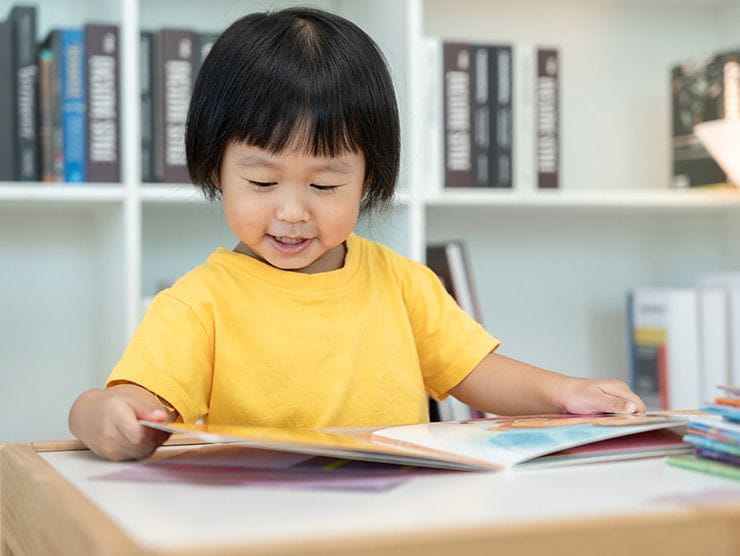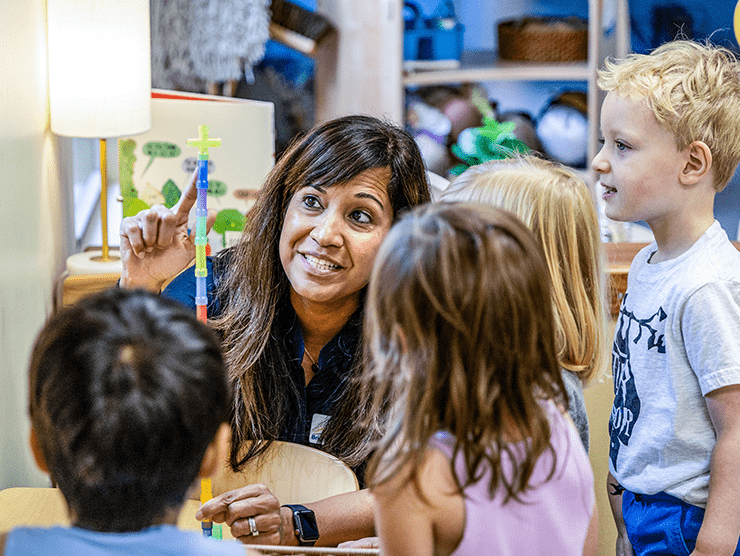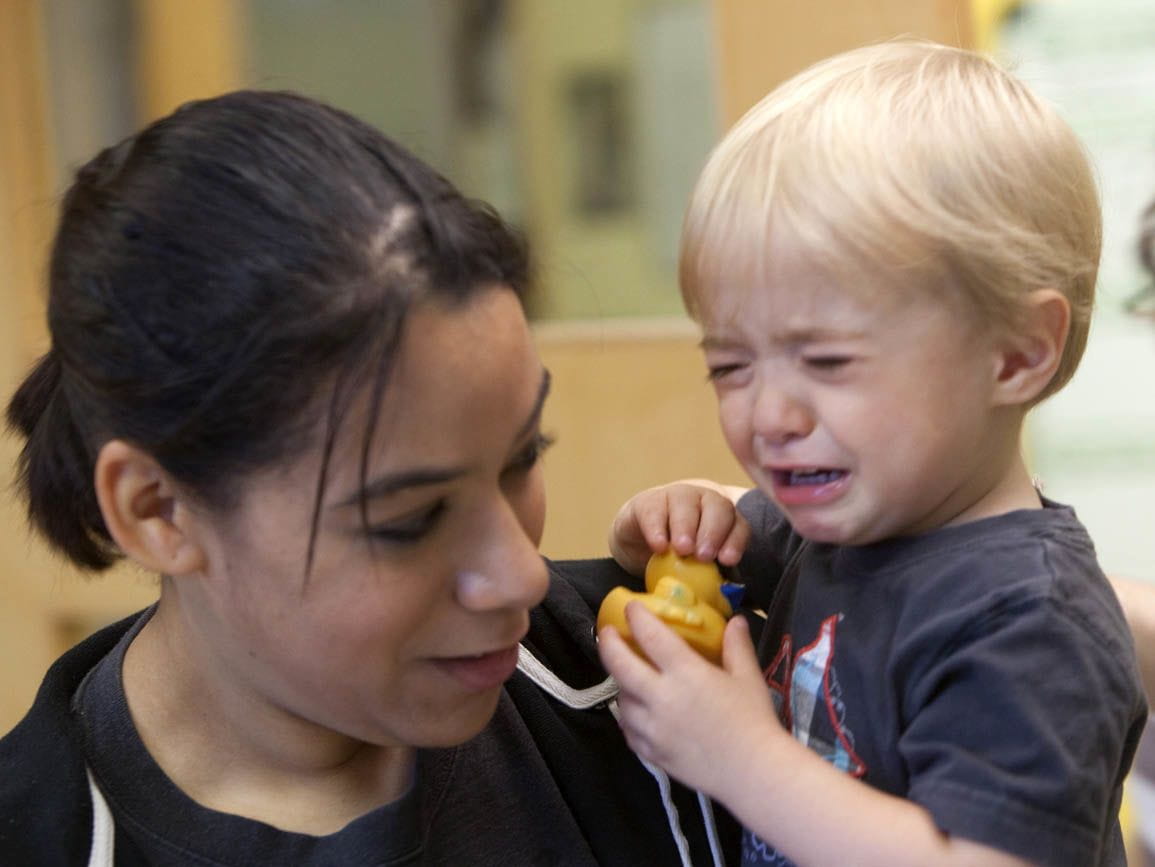Preschool is much more than finger painting and snack time. It is the foundation for a child’s future academic, social, and emotional success. For parents, it is sometimes hard to imagine what exactly is going on during those hours in the classroom, but rest assured, your little ones are soaking up a lot more than you may realize. To understand what kids learn in preschool, take a peek into the typical activities within a Bright Horizons classroom.
Arrival: the adventure begins
Preschool mornings often start with a whirlwind of emotions. There’s the excitement of seeing friends again, and occasionally a few tears as children adjust to the separation, but rest assured, it’s all part of the process. The first lesson of the day is already underway: following routines.
Children learn about structure, expectations, and independence beginning with saying goodbye to their grown-up(s) in the morning. Children hang up their backpacks and jackets, wash their hands, and prepare to make their choices on where they’d like to begin their explorations that day. Consistent, yet flexible, implementation of a classroom schedule fosters a sense of security and predictability, which is crucial for a preschooler’s emotional and cognitive development, while also allowing for spontaneity and considering individual needs and interests.
Learning through play: more than just fun
One of the cornerstones of a preschool program, particularly a Bright Horizons Discovery Driven Learning program, is learning through play. It may seem like your child is just having fun with blocks, dolls, or puzzles, but they are building essential skills while doing so. Play is the primary tool for teaching and development in a high-quality preschool program and is marked by children learning through engaging, hands-on experiences and exploration rather than solely through formal teacher-directed instruction.
When children work on manipulating the pieces of a puzzle, they are learning about spatial relationships, persistence, and problem-solving. When they visit dramatic play and try on dress-up clothes, they are exercising their imagination and empathy as they take on new roles and perspectives. When working on a block tower alongside a classmate, your child is navigating the complex world of social skills—sharing, taking turns, and communicating their needs and ideas.
Morning meeting: setting the stage
In a Bright Horizons preschool classroom, morning meetings are designed to set a positive tone for the day. A time for children to come together as a group, morning meeting fosters community building and supports your child’s social-emotional development as they are greeted for the day, engage in a brief conversations to tie in learning, and set the stage for the day to come. Children are encouraged to interact, collaborate, and share with the group, which provides opportunities to practice social skills, express emotions and manage potential conflict.
Snack: child centered mealtimes
No day would be complete without a snack break, and meal times are more than just a time to refuel. Whether morning or afternoon snack, lunch, or a special meal planned for the day, these times are opportunities for preschoolers to learn essential life skills. As children sit down together, they are socializing, learning how to engage in conversations, understanding concepts like cooperation, waiting, and taking turns. Children learn mathematical concepts such as one-to-one correspondence and sorting as they set the table and scoop their food and fine motor skills as they explore the use of tongs. Child-centered meal times allow preschoolers to be in-tune with their bodies and food preferences, ultimately creating a healthy relationship with food and trying new things. Eating together deepens relationships, not only peer-to-peer relationships, but those between educator and children as well. Engaging in conversations, asking open-ended questions, and playing an active role allows for a slow-paced, relaxed, meal time where the child really is at the center.
Small group experiences: child-led engagement
Well-rounded preschool schedules allow for ample time in small groups, as this is known to be a best practice in supporting the development of social-emotional and cognitive skills. In a supportive environment, small groups allow for more individualized attention and differentiated instruction, meeting children where they are developmentally, as they uncover topics and explore areas of interest.
Here, process trumps product and creativity takes center stage. In a high-quality preschool program, the classroom environment has already been set up as the third teacher; a place where preschoolers can navigate independently according to their skills and interests, boosting confidence as they learn ways that best suit them as individuals. In these supportive environments, children have access to and are encouraged to use different materials to express themselves through the visual arts, navigate the scientific method through inquiries and investigations, practice problem-solving through dramatic play and much more, weaving social-emotional learning throughout it all.
Outdoor exploration: bringing the indoors out
Outdoor play is an essential part of the preschool daily schedule. Often happening at least twice during a full day, this time encourages physical development, healthy risk-taking, mindfulness and connection to the natural world. Whether climbing structures on the playground, digging tunnels in the sandbox, playing a coordinated game or simply enjoying a nature walk, being outdoors provides children with the opportunity to understand teamwork, collaboration, how to manage themselves in a group setting, and offers the chance to build gross motor skills and eye-hand coordination.
Departure: wrapping it all up
As the day winds down, children in a Bright Horizons preschool program often come together for an afternoon connection. Here, they may reflect on their day’s experiences and learning that took place. This isn’t just about verbalizing experiences; it is about emotional expression and self-awareness. Children are continuing to build the skill of articulating their feelings and experiences, which is key to success in school and beyond.
When it’s time to go home, children may be tired yet filled with new knowledge and experiences. From socializing and following routines to exploring creativity and problem-solving, preschool is an adventure that sets the stage for all the exciting learning yet to come.
Now that you know what kids learn in preschool, discover how to prepare your child for the first day of child care on this episode of Teach. Play. Love.





